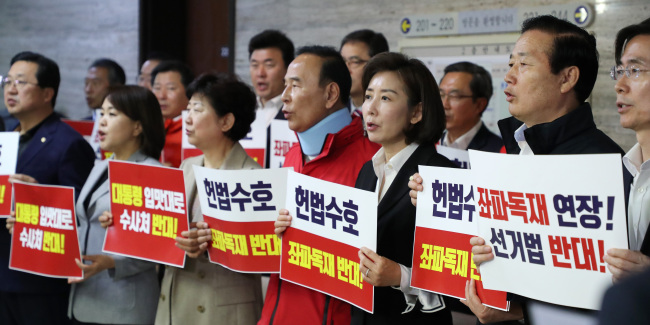The petitions board of the presidential office website is once again making headlines, this time over calls for the dissolution of political parties.
A petition filed on April 22 requesting the dissolution of the main opposition Liberty Korea Party had garnered over 461,177 signatures as of 5:30 p.m. Monday.
 |
Liberty Korea Party lawmakers hold a protest at the National Assembly on Monday. Yonhap |
The petition claims the party is hampering legislative activities by staging protests outside the parliament, and has placed the public in significant danger by reducing the government’s budget related to public safety.
The petition also raises issue with Liberty Korea Party lawmakers, including floor leader Rep. Na Kyung-won, citing controversial comments.
The Liberty Korea Party is currently attempting to prevent the ruling Democratic Party of Korea and minor opposition parties from fast-tracking legislation on election reform and the establishment of a body for investigating crimes by high-ranking government officials.
In the process, Liberty Korea Party lawmakers detained a lawmaker in his office and have engaged in physical confrontations.
In response, ruling and minor opposition lawmakers have filed criminal complaints against a number of Liberty Korea Party members.
With the petition gaining public and media attention, petitions calling for the Democratic Party’s dissolution have also cropped up.
A number of similar petitions have been filed, but the petition with the largest support was posted Monday, scoring 4,202 signatures as of 5:30 p.m Monday.
The petition accuses the Democratic Party of “left-wing dictatorship,” and claims that the party was attempting to push election reform and a government official investigation body through “abnormal” means.
While Cheong Wa Dae’s policy is that it or the concerned government organization respond to a petition with more than 200,000 signatures within 30 days, the matter of dissolving a political party is a complex issue that requires more than popular support.
The Constitution states the government can bring an action to dissolve a party to the Constitutional Court if “the purposes or activities of a political party are contrary to the fundamental democratic order.”
The only party to be dissolved following a Constitutional Court ruling was the Unified Progressive Party, which was dissolved Dec. 19, 2014.
In the case of the Unified Progressive Party, the government requested the Constitutional Court’s deliberation, having deemed that the party had become pro-North Korean and was taking direction from the North.
The action was filed on Nov. 5, 2013, after former UPP lawmaker Lee Seok-ki was arrested on charges of planning a rebellion. Lee was ultimately acquitted of planning a rebellion, but found guilty on charges of inciting rebellion and of violating the National Security Act.
Before the action was filed, a Ministry of Justice task force reviewed the matter for nearly two months.
By Choi He-suk (
cheesuk@heraldcorp.com)








